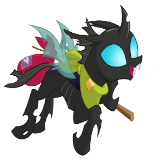Les Misérables · 8:11pm Mar 29th, 2013
It took me nearly two and a half months, but I'm done. What a journey. It is beyond my ability to talk about this book, but I will do my best.
Short answer: it was easily one of the best books I've ever read.
Longer answer: It was very difficult to read. There were parts of it that were very mediocre (the enjoyability of the book is inversely proportional to how often Hugo references ancient Rome, its gods, and its people). Though the digressions were at times interesting, many of them overstayed their welcome. At times, Hugo uses words that have no English equivalents, and the translator tried to "anglicize" the words.
But beside its abject villains, it has the greatest of heroes and the most admirable of men (namely, Jean Valjean); it shows the best of humanity alongside the worst of humanity. The Battle of Waterloo, though coming out of nowhere, was damn interesting to read about. I can't talk enough about Jean Valjean; every scene with him makes me cry. The societal angst that gave birth to the June Rebellion, that lost bit of history, is documented insanely well; the battle scenes are the most well-written battle scenes I've ever read; I.e., The Epic in the Rue Saint-Denis is incredibly epic. That part is a page-turner, to be sure, nothing boring in that part. The quality of the prose is unparalleled, and it has been excellently translated.
Yes, it's not perfect. Cosette is sugarcoated to the point where it becomes bland; unlike Valjean, her goodness isn't really that "heroism" image you see on the Rue de la Chanvrerie; it really feels like Hugo is consistently rubbing in the reader's face how sweet she is, while Valjean proves his goodness by his good deeds; very rarely does the narrator, unlike with Cosette, explicitly say "Jean Valjean is a good man." The digressions overstayed their welcomes at times (though, to be fair, the infamous rambling of the sewer part is exaggerated, and it's not as egregious as, say, the description of the convent). Some chapters have not aged well, being mostly lists of names and stuff.
But it's still a damn good story. The characters are huge; France is tumultuous; the scenes are grand; the prose seems to whirl away on the winds; the characters fill their important roles. Javert, though a good antagonist, is not as complex or as interesting as, say, Monsieur de Villefort from The Count of Monte Cristo, but he's so tragic, so fun to read about, that I don't mind. There's a lot to admire, a lot to despise, a lot to pity—and it is a heart-render. I'm quite sad that it's over, to be honest.
Like I said, it's beyond my ability to talk about this book, so I think I'll end it here. Oh, one more note: while reading it, I thought it slightly improbable to watch Eponine stand up to the Patron-Minette in the Rue Plumet. How could this skinny, malnourished girl stop the meanest, baddest street-gang in Paris, even after one pulls a knife on her? After seeing this picture, I understand how:

If I was Montparnasse, I'd be fucking terrified too


